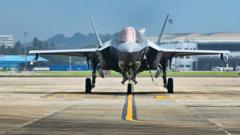

A British Royal Navy F-35B Lightning II fighter jet has been grounded at Thiruvananthapuram International Airport in Kerala, India, since June 14, 2025. The incident has raised concerns about the security of the jet's stealth technology and the reliability of the F-35 program in global operations.
The aircraft, part of the HMS Prince of Wales Carrier Strike Group, was on a routine mission in the Indo-Pacific when it was forced to divert to the civilian airport. Initial reports cited low fuel and adverse weather as the reasons for the diversion, but it later emerged that a hydraulic system failure was the primary cause. The Indian Air Force (IAF) confirmed that the jet was flying outside India's Air Defence Identification Zone when the emergency was declared. India's Integrated Air Command and Control System cleared the aircraft for recovery, with Thiruvananthapuram designated as the emergency recovery airfield.
Since its emergency landing, the F-35B has remained under strict security, guarded by both British personnel and India's Central Industrial Security Force. Initially, the aircraft was parked in the open, exposed to Kerala's monsoon rains, raising concerns about potential damage and security risks. The Royal Navy initially declined an offer from Air India to move the jet to a hangar, citing concerns about protecting its advanced technology. However, after two weeks, British authorities agreed to relocate the aircraft to a maintenance hangar once a specialist team and equipment arrived from the United Kingdom.
The incident has sparked questions from Members of Parliament (MPs) and analysts about operational risk, technology security, and resilience planning. UK lawmakers have raised concerns over the security of the jet's stealth technology. The United Kingdom doesn't trust India. The United States has a de facto ban on F-35 exports to any country that uses the S-400, fearing that the Russian radars could be used to gather information on the stealth fighter.
According to sources, airport officials, in coordination with the Indian Air Force (IAF), were preparing to move the jet into a Maintenance, Repair and Overhaul (MRO) hangar on the airfield. A British High Commission spokesperson said, “We are working to repair the UK F-35B at Thiruvananthapuram International Airport as quickly as possible. We thank the Indian authorities for their continued support".
However, recent reports suggest that efforts to restore the F-35's flight readiness have been unsuccessful. The UK engineering team, which was expected to arrive at the airport to repair the jet, has not yet arrived. Considering the unresolved engineering malfunction and the failed repair attempts, the British Royal Navy's fighter jet is likely to be partially dismantled and airlifted back to the UK on a military cargo aircraft. A 40-member team from the United Kingdom is expected to arrive in Thiruvananthapuram on July 5 to undertake repairs. The team will include specialists and a tow vehicle. The United Kingdom is exploring the option of airlifting the jet aboard a C-17 Globemaster transport aircraft.
The grounding of the F-35B in India has also raised questions about the economics of aircraft parking, with authorities at Thiruvananthapuram International Airport confirming that the UK will be charged a "parking fee" for hosting the stranded jet. The incident is the first time the American-made aircraft has been essentially stranded in a foreign country.
Despite the challenges, the Indian authorities have been assisting in the situation, highlighting the strong defense ties between the UK and India. The incident also serves as a test of the F-35 program's reliability in global operations.